#Le Reviewer
Explore tagged Tumblr posts
Text

i puzzled over this for a long time.......and then i realised:

i have to ask: does. does this person somehow think...that javert and petit gervais are. the same person?
#i'm honestly wracking my brain trying to think of what else they might have meant by this#i'm coming up empty#what else could it mean???#please tell me if i'm missing something?#either way i've had a good laugh about it#petit gervais#javert#les mis#les miserables#les misérables#les mis reviews#les mis shitposts#sylvie's own nonsense
339 notes
·
View notes
Text



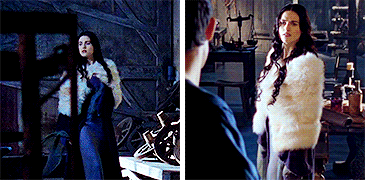



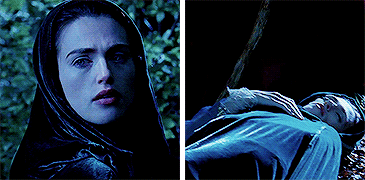
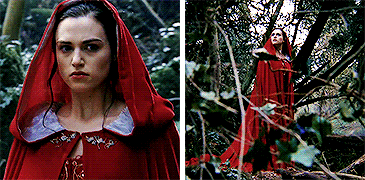


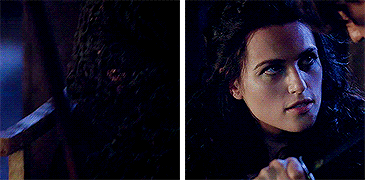
MORGANA | Cloaks, Coats, & Covers ➛ first & last appearances
#morganaedit#merlinedit#katiemcgrathedit#merlingifs#bbcmorgana#katie mcgrath#morgana le fay#perioddramaedit#morganapendragonedit#merlin#morgana*#gifs*#*#morganaoutfits#okay after a lot of time closely comparing the two and reviewing bts footage i am 99% certain that the fur coat from s1 was the same as s5#but it makes me laugh because morgana must've snuck into camelot at some point to get it back#also as with the last outfits set i did not include things that only appeared in one episode#i plan to do another set with single appearance outfits
285 notes
·
View notes
Text
So I'm sure everybody cares but I went to see "le comte of Monte Cristo " (the last adaptation with Niney) and got out of the theater with a splitting headache but absolutely amazed and admiring.
I am a big reader and read a lot of Alexandre Dumas (including Monte Cristo a long time ago) and other dramas and "sad" books but I always was reluctant to see real dramas with ambiguous or sad endings. The only reason I went to see the movie was bc I liked the book.
The movie is in fact harsh, sad and VERY dramatic (like the book) but it is extremely well realised. All of the actors play extremely well and the length to wich Niney went to prepare for the role shows trough the screen.
I was so enthralled by the movie I forgot to eat my popcorn. The movie manages to create an atmosphere like a bubble, and despite not managing to remember very well the book , I did feel IN the book, taken by the story as I had read it.
Yeah so in short, go spend 3h in a theater to watch this film, it's worth it
#alexandre dumas#le comte de monte cristo#pierre niney#the count of monte cristo#Monte Cristo#film review#Who will hyperfixate on the books again and finish them all in three days ?#Because the movie messed with their heads and they can't remember shit about the book now#french movie
90 notes
·
View notes
Text
a few years back i visited the Chateau d'If and was told about the story of the Comte de Monte Cristo, was horrified when seeing the cells, and promptly forgot about most of it, except the view
fast forward this afternoon when i got into a theater to watch the new Le Compte de Monte Cristo movie AND GODDAMIT ITS SO GOOD
if youre into revenge plot, go see it
if youre into swashbuckler go see it
if you like boats/historical settings and fashion/historical gays (small part of the movie but still)/ good cinematography/beautiful night\dark scenes you can ACTUALLY SEE/seeing slave traders getting their comeuppance/generally horrible people losing everything/competence porn/ GO SEE IT
ITS SO GOOD
137 notes
·
View notes
Text


The universe has answered my prayers!
#I'm crying it's too beautiful#I think I need to review the rating of my favorite vnc covers#vanitas no carte#vnc#the case of vanitas#les memoires de vanitas
122 notes
·
View notes
Text
I want to be a vampire too: rant
played 2 routes of ikemen vampire so far. I love the game, but both times I have wished that there was an option to join them as a vampire at the end.
I don't understand why becoming a vampire is posed so negatively in the game, but whenever it comes up in the routes it's coded like it's a terrible option that MC doesn't want to do.
Well, au contraire! If I had a chance to become a sexy vampire in a mansion full of other sexy vampires I would take it ... especially if the person I was in love with was also a vampire. If both are vampires doesn't that mean more time you get to be together??
TLDR I want to become a vampire at the end of my romance and I haven't had my way yet,
#ikevamp spoilers#cybird please im begging you let me be a vampire too#can you tell i have main character syndrome#but fr fr I rly dont understand MC#like you could live a whole extra century or so with your mans#and you instead want to age way faster than him and leave him alone?? how does that make sense#it just rly gets on my nerves that MC doesn't want to be a vampire#because i do#it sounds so epic#ykwim ?#the routes i played are sebastian and leonardo#both so far we dont get to vamp out#ikevamp sebastian#ikemen vampire#ikevamp#ikevamp leonardo#ikevamp le comte#ikemen vampire mc#ikevamp isaac#ikevamp napoleon#ikemen vampire theo#cybird otome#ikemen vampire x reader#ikemen vampire review#ikevamp review
106 notes
·
View notes
Text
Discussion summary: Left Hand of Darkness
Published in 1969, The Left Hand of Darkness is a classic in science fiction that explores issues of sex/gender in an alien-yet-human society where the aliens are just like us except in how they reproduce. These aliens, the Gethenians, can reproduce as either male or female. They spend most of their lives sexually undifferentiated. Once a month, they go into heat (“kemmer”) and their sexual organs activate as either male or female (it’s essentially random).
Here's a summary of the discussions we had on 2023-08-25 and 2023-09-01 about the book:
HIGH LEVEL REACTONS
Michelle (@scifimagpie): even though it was written by a cis straight perisex woman there is a queerness to the writing that feels true and that she nailed. There is a queerness to the soul of this book that still holds up, that's true and good, and I cannot but love and respect that.
Elizabeth (@ipso-faculty): this book is such a commentary on 1960s misogyny. Genly is a raging misogynist. It takes a whole prison break and crossing the arctic for Genly to realize a woman or androgyne can be competent 👀
Dimitri: [Having read just the first half of the book] I wonder if it keeps happening, if Genly keeps going "woaaaah" [to the Gethenians�� androgyny] or if he ever acclimates. It's been half the novel my guy
vic: yeah a book where a guy is destroyed by seeing a breast makes me want queer theory
vic: [it also] makes me feel good to see how much has changed [since the 1960s]
THE INTERSEX STUFF
A thing we appreciated about the book was how being intersex is contextual. The main character of the book, Genly Ai, is a human from a planet like Earth, who visits Gethen to open trade and diplomatic relations.
On his home planet, and to Earth sensibilities, Genly is perisex - he is able to reproduce at any time of the month and is consistently male.
But on Gethen, Genly becomes intersex. On Gethen, the norm is that you only manifest (and can reproduce as) a given sex during the monthly kemmer (heat/oestrus) period.
The Gethenians understand Genly as living in “permanent kemmer”, which is described as a common (intersex) condition, and these people are hyper-sexualized and referred to as Perverts.
At this point it’s worth noting that depiction is not the same as endorsement. Michelle pointed out the book is very empathetic to those in permanent kemmer. LeGuin does not appear to be endorsing the social stigma faced by these people, merely depicting it, and putting a mirror to how our own society treats intersex people.
Throughout the book, Genly is treated as an oddity by the Gethenians. He is hyper sexualized. He undergoes a genital inspection to prove he is who he says he is.
When Genly is sent to a prison camp and forcibly given HRT, he does not respond “normally” to the hormones, the effects are way worse for him, and the prison camp staff don’t care, and keep administering them even if it’ll kill him.
Two of us have had the experience of having hyperandrogenism and being forced onto birth control as teenager, and relating to the sluggishness of the drugs that Genly experienced, as well as the sense that gender/sex conformity was more important to authority figures (parents, doctors) than actual health and well-being.
Another scene we discussed the one where Genly is in a prison van en route to the gulag, and a Gethenian enters kemmer and wants to mate with him and he declines. He is given multiple opportunities over the course of the book to try having sex with a Gethenian, and declines every time, and we wondered if he avoided it out of trauma of being hyper-sexualized & hyper-medicalized & having had his genitals inspected.
We discussed the way he described his genital inspection through a trauma lens, and how it interacts with toxic masculinity - in vic’s terms, Genly being "I am a manly man and I have don't trauma"
Those of us who read the short story, Coming of Age in Karhide, noted that once the world was narrated from a Gethenian POV, the people in permanent kemmer were treated far more neutrally, which gave us the impression that Genly as an unreliable narrator was injecting some intersexism along with his misogyny
WHY IT MATTERS TO READ THIS BOOK THROUGH AN INTERSEX LENS
Elizabeth: I’ve encountered critiques of this book from perisex trans folks because to them the book is committing biological essentialism, and dismissing the book as a result. I think they’re missing that this book is as much about (inter)sex as it is about gender. I think they’re too quick to dismiss the book as being outdated or having backwards ideas because they’re not appreciating the intersex themes.
Elizabeth: The intersex themes aren’t exactly subtle, so it kind of stings that I haven’t seen any intersex analyses of this book, but there are dozens (hundreds?) of perisex trans analyses that all miss the huge intersex elephants in the room.
Also Elizabeth: I’ve seen this book show up in lists of intersex books/characters made by perisex people, and I’ve seen Estraven listed as intersex character, and it gets me upset because Estraven isn’t intersex! Estraven is perisex in the society in which he lives. Genly is the intersex character in this story and people who misunderstand intersex as being able to reproduce as male & female (or having quirky genitals smh) are completely missing that being intersex is socially constructed and based on what is considered typical for a given species.
WHAT THE BOOK DOESN’T HANDLE WELL
The body descriptions. As Dmitri put it: “ Like "his butt jiggled and it reminded me of women" ew. It was intentional but I had to put the book down. It reminded me of transvestigators and how they take pictures of people in public.” 🤮
Not pushing Genly to reflect on how weird he is about other people’s bodies. We all had issues with how Genly is constantly scrutinizing the bodies of other humans to assess their gender(s) and it’s pretty gross.
vic asked: “how much of this is her reproducing violence without her knowing it? A thing I didn't like was how he always judging and analyzing people's bodies and realizing others treat him that way. And I wish there was more of his discomfort about this, that it made him feel icky.”
Dimitri added: “I really wanted him to have a moment of this too, for him to realize how much it sucks to be treated this way. As a trans person it's so uncomfortable. What are you doing going around doing this to people?”
Using male pronouns as default/ungendered pronouns. Élaina asked why Genly thinks a male pronoun is more appropriate for a transcendent God and pointed out there’s a lot to unpack there.
OTHER POSITIVES ABOUT THE BOOK
Genly’s journey towards respecting women, that he still had a ways to go by the end of the book. vic pointed out how “LeGuin was straight, and she loves men, and is kinda giving them the side-eye [in this book]. Her writing about how Genly is childish makes me really happy. It’s kind of hilarious to watch him bang his head against the wall because he’s so rigid.”
To which Dmitri added: “I agree with the bit on forgiving men for stuff. I don't know how she [LeGuin] does it but she really lays it all out. She gives you a platter of how men are bad at things, how they make mistakes that are pretty specific to them. She has prepared a buffet of it.”
Autistic Estraven! As Michelle put it: “autistic queer feels about Estraven speaking literally and plainly and Genly not getting it”
The truck chapter. Hits like a pile of bricks. We talked about it as a metaphor for the current pandemic.
The Genly x Estraven slowburn queerplatonic relationship
The conlang! Less is more in how it gets used
MIXED REACTIONS
The Foretelling. For some it felt unnecessary and a bit fetishy. For others it was fun paranormal times.
Pacing. Some liked how the book really forces you to really contemplate as you go. Others struggled with a pace that feels very slow to 2023 readers.
WORKS WE COMPARED THE BOOK TO
Star Trek (the original series) - we wondered if LHOD and Genly Ai were progressive by 1960s standards, and TOS came up as a comparison point. We were all of the impression that TOS was progressive for its time but all of us find it pretty misogynist by our standards. The interest in extra-sensory perception (ESP) is something that was a staple of TOS that feels very strange to contemporary viewers and also cropped up in LHOD
Ancillary Justice - for being a book where characters’ genders are all ambiguous but the POV character is actually normal about how they describe other characters’ bodies.
The Deep - for being another book in a situation where being able to reproduce as male and female is the norm. The Deep was written by an actually intersex author, and doesn’t have the cisperisex gaze of scrutinizing every body for sex. But oddly LHOD actually winds up feeling more like a book about intersex people, because it features a character who is the odd one out in a gonosynic society. In contrast, nobody is intersex in the Deep - everybody matches the norms for their species, which makes the intersex themes in the work much more subtle.
Overall, as vic put it, “there's something to be said about an honest depiction that's not great, especially when there's no alternatives”. For a long time there weren’t many other games in town when it came to this sort of book, and even though some things now feel dated, it’s still a valuable read. We’d love to see more intersex reviews & analyses of the book!
#intersex book club#book summaries#book reviews#left hand of darkness#the left hand of darkness#ursula k. le guin#intersex books#intersex literature#queer books#queer literature#queer fiction#queer scifi#intersex
181 notes
·
View notes
Text
I Miss The Case Study of Vanitas Because Sex

Okay, please forgive me for the clickbait-y title, but I just had to take it. The whiplash is too fun to me. Anyways, yes, I miss The Case Study of Vanitas (both as an anime and manga, since we've not gotten vol 10 in English yet) because of sex. Not the act in and of itself, but the appeal, the tension, the experience. Animanga isn't nearly as sexless as North American media, but it presents its own unique challenges and issues. So, if you don't mind, please humor my little foray into an attempt to explain the decoupling of fan service and sex appeal, with The Case Study of Vanitas as a medium.
⚠️Warning: I've done my best to keep it spoiler free, but by nature there is mild spoilers in regards to characters and certain interactions.⚠️
Is The Case Study of Vanitas about sex? Well, obviously not, no, it's about vampires. But as much as it's about vampires, it's also about despair, hope, penance and revenge, and the intricacies of the human condition. It just happens to feature vampires as the selling point. And I believe therein lies the best explanation of Vanitas: it's not about sex, but rather contains those aspects as a part of the people that exist in its world.
Fanservice has become a rather perverted term. Rather than appealing to a broad range of applications, fanservice tends to exclusively apply to displays that are sexual in nature (most typically in regards to catering to male audiences). In that way it's not particularly awful in how the term itself has shifted, but the use of fanservice is borderline pathetic in most series. A gaudy display of body parts, it hangs on excessive scale and movement to catch the eyes of touch starved individuals. I don't need a ballooned bosom besetting my vision before bobbing about in a baroque display for all too long. That's not the point.
But what is the point? Well, I've prattled on long enough so here's an example.
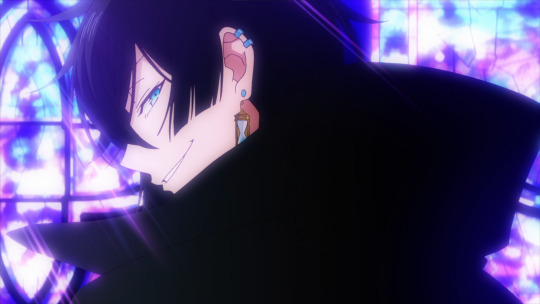
A look in the eyes, the right lighting. Even simple posing. Sex appeal is not limited to explicit displays of sexuality, but is rather the personification of both the character's intent as well as their external perception.
There are so many moments in this series that are in no way explicitly sexual, but can easily be perceived to have sex appeal or sexual tension.
But then, how would that appeal not feel weakened? It's a good question, honestly, and an important one to ask. When you display the chest of an underaged girl enough times, it won't elate the audience enough to be perceived as "good". It's a universal issue with storytelling, so how does Vanitas get around it?
My answer (and perhaps not the only answer) is how this appeal and tension is derived. I had sort of said it earlier, but didn't really explain. Its source is the very nature of the characters and world. It is not an external force exposing these facets, but the machinations of the plot and its pieces themselves.
Have a look at this example here. Vampires are hot, right? Their power, broody nature, and the concept of the unknown have played into their eroticism and appeal since time immemorial (seriously, look up Carmilla). Vanitas pounces on that concept and immediately plays into it. We don't get blood sucking every episode and every second, no. But we get it enough to provide variation, it appears at the right time to provide another layer to the nature of the story and characters.
Anyways, the example. Lord Ruthven and Noe. Two vampires, engaging in something strictly non-sexual. He is simply biting Noe. But the posing, the nature of the layout. It presents tension. It presents Ruthven's ownership and commanding nature of Noe in this moment. Domination and subjugation.
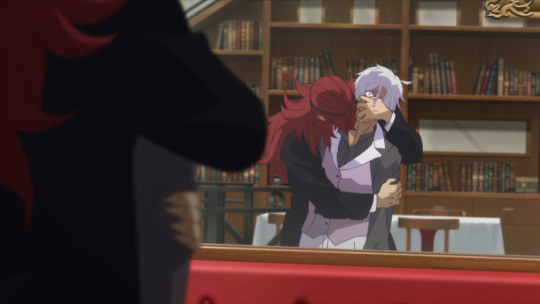
Even more is this sequence. The commanding nature that presents a clear power dynamic. The phrasing. It absolutely exudes sexual tension. But nothing of the sort is apparent in the actual interaction.
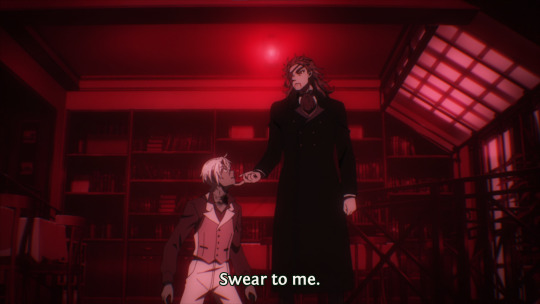
So what's the deal here. I know I had spoken on how characters themselves can convey tension and appeal without explicit intent to do so, but how can circumstance and interaction play into it as well?
Another lovely question. What comprises the act of sex? What are the pieces that elate, entice, and encourage someone? Well, aside from the answer that it's down to the individual, there's a few core pieces. The "top and bottom" dynamic is certainly the one that appears the most when dealing with pairs. Another, while a bit unseemly and slightly (?) taboo is the concept of fear and violence. Of course, I don't mean in any serious context, but the concept is how those things make you feel, and that they stem from that similar power dynamic. Perhaps that's the best word to describe it with: power dynamic. It's all about how two characters interact with each other, where they stand in relation to one another. The above image is the perfect example of that, and the following is how to build on it.
Vanitas and Jeanne, an incredible combination born not out of a mutual desire for the other, but the sheer interest of one and the needs of another. It's a one sided love spurred on by the actions of one that encourages the other to let loose. It creates the interesting dynamic of a power bottom that remains refreshing alongside the other relationships that exist in the story.
So here's a clip of that dynamic.
The way the camera and characters hang on each moment, the way the layouts aim to both obstruct but also apply razor focus. The voice acting. All of it, every single moments provides for that tension and appeal, and it extends past the act of sucking blood and into the souls of the characters themselves. A terrible plead that spills from blood stained lips, a promise that comes from the origin of that crimson.
This "sex appeal" and "sexual tension" is not something manufactured, but the absolute core of these characters. The act of domination, the incredible an undesired need of a substance, the mental fractures eroding at the ego of a person. All of these moments stem from the very souls of the characters and bubble up to the surface in these forms of expression. Where words will not do, actions speak in their place.
Also, Vanitas moaning. Yes please. The greatest benefit to this series is the fact that it's willing to lean into the men as well. This is not "just" for the guys (and lesbians), no. This is for everyone, but especially those that enjoy a side of insanity and toxicity to their romance.
So that brings us to the end. Vanitas is not "about" sex, Vanitas is sex and is the purest way to deliver on fan service while providing sexual tension and appeal. It's subtle, subdued, infrequent and benign. It does not bend to the desires of the viewer, but rather stems from those of the characters. And so many series need to take note. "Lucky Lecher" and perversely excessive displays have no home in my heart when there are far more artistic and desirable sequences that can be produced.
#vanitas no carte#the case study of vanitas#vanitas of the blue moon#les memoires de vanitas#vanitas jeanne#vnc vanitas#jeanne the hellfire witch#dominique de sade#vanoe#noe archiviste#august ruthven#lord ruthven#vnc jeanne#vanijeanne#vnc#anime and manga#anime#manga#anime recommendation#anime review#manga reccs#manga recommendation#manga review
273 notes
·
View notes
Text
I'm so fascinated by how conservative reviews of Les Mis often recreate the same attitudes towards Valjean/Javert that Victor Hugo criticizes in the novel. If you've been following @psalm22-6's work collecting contemporary 19th century reviews of Les Mis (and you should!) you'll know that contemporary conservative reviewers often despised Valjean and praised Javert. This is also true for many modern conservative reviewers. And that's interesting because the larger commentary Hugo was making with the Valjean/Javert parallels is that....."Both Valjean and Javert were born in dire poverty and stigmatized because of the time they spent in prison. But wealthy conservative society hates Valjean because he's an outcast who will break their laws in order to defend marginalized people....while they approve of Javert, because Javert would happily destroy himself and everyone around him in order to lick their boots." Valjean is hated because he's "rebellious," Javert is accepted because "knows his place." Jean Valjean is "repugnant" because he would steal a loaf of bread to feed his family, and Javert is "noble" because he would happily sentence his entire family to die for the sake of obeying authority. Valjean is treated like a wild animal, while Javert is praised for his constant bootlicking subservience in the patronizing way you'd praise an obedient dog. I don't know, it's interesting to see these reviews recreating the same bigotry Hugo comments on in the novel. Reviewers make insulting bigoted comments about Valjean, and then praise Javert for how obedient/subservient he is and how he shows the Correct way for a lower-class inspector to behave, without any shred of self-awareness.
#les mis#valjean javert parallels#valjean/javert parallels#i will fight every reviewer who says negative things about valjean#hes just an unbearably sad beast. leave him alone#he's sad enough#hes just a devastated little man
266 notes
·
View notes
Text
My Favorite New Manga and Graphic Novels I Read in 2023
It's time to take a look at the comics and manga I read this year! I read a whopping 78 manga and graphic novels in all. Here's a link to my Goodreads year in books (the manga is at the beginning, the novels start with Siren Queen) and my storygraph wrap up.
I also read 36 novels! If you want to see my favorites, check out my reviews here!
And finally, I've got the continuing manga series I've enjoyed this year here, so check that post out too!
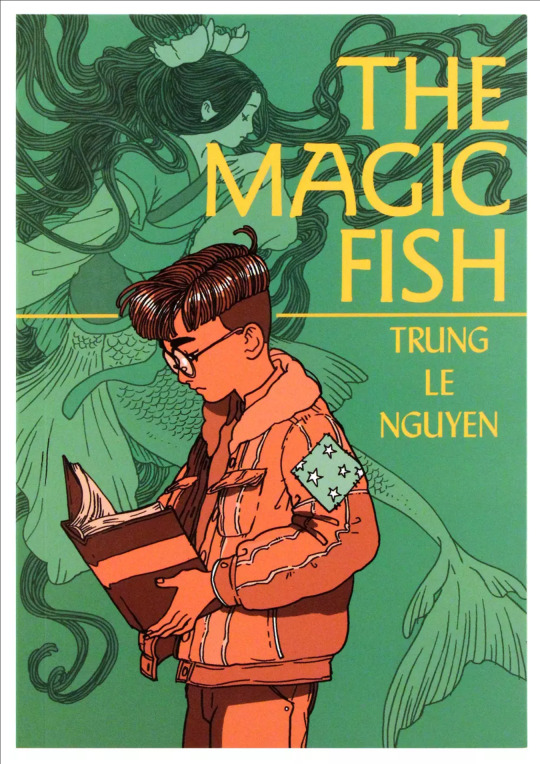
The Magic Fish by Trung Le Nguyen
This is a tale about a first-generation Vietnamese-American boy struggling with coming out to his mother. He connects with his mother through fairytales-- she uses them to express her journey as an immigrant, and he uses them to explore his queerness and identity as a Vietnamese kid growing up in America. It's an absolutely gorgeous book full of Trung Le Nguyen's signature stunning art. The fantastical, ethereal fairy tales are weaved beautifully into the lives of the characters. The book explores how fairy tales can form connection, can express culture, can tap deeply into something real and true, and can offer tragedy and catharsis. The protagonist uses fairy tales to write his own story, and the ending is lovely and moving.
Exit Stage Left: The Snagglepuss Chronicles by Mark Russell and Mike Feehan
You may know Mark Russell from his darker, socially aware re-imagining of the Flintstones, which made quite a splash on Tumblr with this post. Well, I had pleasure of meeting him at a local convention, and I finally got his comic re-imagining of Snagglepuss, also of Hanna-Barbera. He re-imagines the titular pink puma as a closeted gay playwright in the 50's dealing with McCarthyism. It's as wild as it sounds,but also really digs into the politics of the time, the struggle of standing against oppression and how art fights through suppression and censorship. It's tragic, hopeful, poignant and full of historical references. I enjoyed it ! Definitely be cautious if you're deeply disturbed by homophobia and suicide.
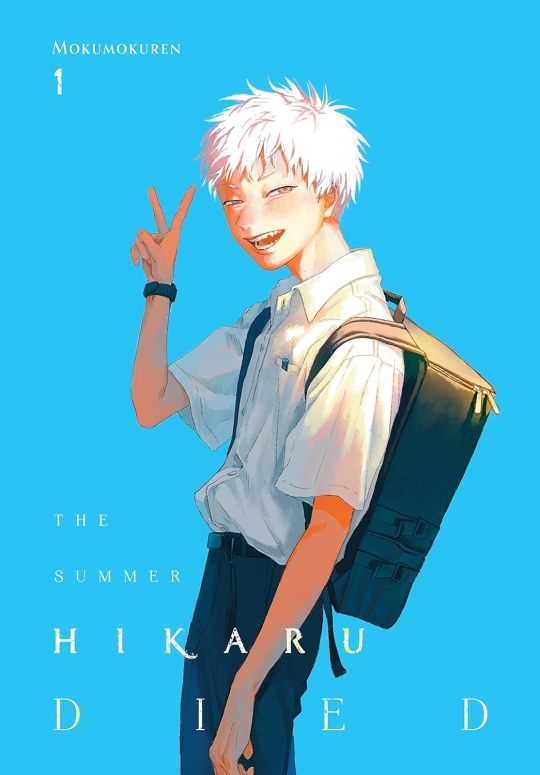
The Summer Hikaru Died by Mokumokuren
A story about a teenage boy, Yoshiki, who realizes that his best friend and crush Hikaru has died and been replaced by a strange eldritch being who is imitating him. But, missing his loved one and desperate to cling to any piece of him, Yoshiki decides to keep on having a relationship with this mysterious entity. This book's horror is visceral and sublime, especially the bizarre, creepy, beautiful body horror involving the being who replaced Hikaru. It's an exploration of anxieties involving grief, relationships, and sexuality that hits just right, and the atmosphere layered with dread is top notch. I love me some messed up relationships and unknowable queer monsters, and this book delivers.
Chainsaw Man, Look Back and Goodbye Eri by Tatsuki Fujimoto
Chainsaw Man needs no introduction, but I did end up really enjoying the story of the doggy-devil boy hunting other devils. It got so tragic and intense at the end, with lots of great surreal horror imagery and darkly funny moments. I'm impressed it went so hard, though the random powers that kept piling up made what was happening hard to follow at times, especially in fights. I'm also enjoying the current weird arc starring a class-A disaster girl and the demon sharing her body.
Look Back
I really do enjoy how Fuijimoto writes messy pre-teen/teenage girls. They ring so true. The manga follows the fraught friendship between two girls as they create manga, exploring the struggle of art mixing with real relationships, and how someone keeps creating after tragedy. It's a little hard to follow at times (especially since I have to differentiate the leads based on hairstyle), but it's a good read.
Goodbye Eri
Probably my least favorite of the three, but it's a fun read- a weird ride that examines the thin line between fiction and reality in art and makes good use of Fujimoto's cinephile background and signature gaslight gatekeep girlboss characters.
Is Love the Answer? by Uta Isaki
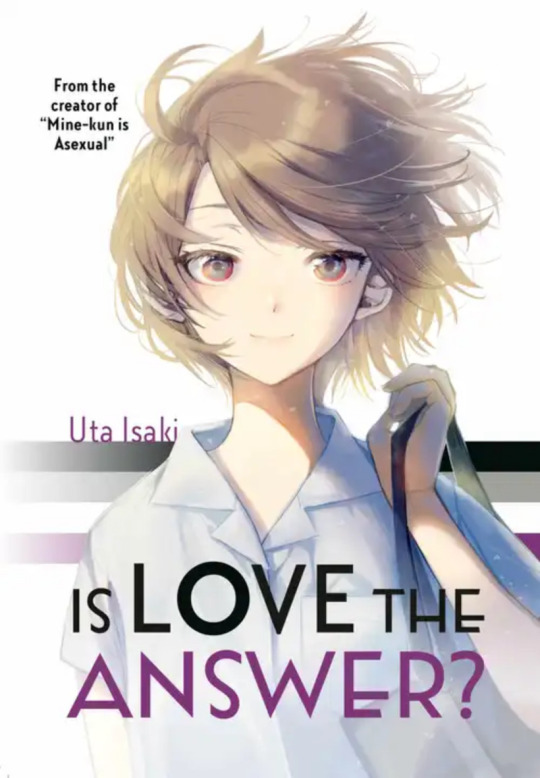
The story follows a teenage girl, Chika, who has always struggled with not being attracted to anyone. When Chika enters college, she meets queer people all across the spectrum of asexuality, and starts exploring her own identity. As an ace, this is the best story about asexuality that I've read. It was a nuanced look at asexuality and queerness and all the variations. Chika's journey and how she found her community was moving and poignant. It's a honest, moving look at relationships and identity, and how complicated and hard to define both of those things can be. I loved the moments of Chika imagining herself as an alien to explore and cope, and how she bonded with people through magical girl shows and other geekery. My favorite new manga of the year, it really connected with me!
The Girl that Can’t Get a Girlfriend by Mieri Hiranishi
Oh girl, I've been there. This is a fun autobiographical comic about a butch4butch lesbian's struggles finding a partner in a word that favors butch/femme, and it's just an honest look at the messiness of loneliness and relationships. I also appreciate that crushing on Haruka in Sailor Moon and becoming a HaruMichi stan was the beginning the author's queer awakening because uh...same! She has taste, and is truly relatable.
Qualia the Purple: The Complete Manga Collection by Hisamitsu Ueo and Shirou Tsunashima
See my review of the light novel here for my general thoughts on the story, since it's adapted pretty faithfully. I do think the manga is overall the best experience though, because the illustrations break up the detailed explanations of quantum mechanics a bit, and it includes a bit of extra content that fleshes things out, especially withthe ending.
The Single Life: 60 year old lesbian who is single and living alone by Akiko Morishima
Just like it says on the tin, this focuses on a 60-year-old single lesbian. And definitely the shortest thing on here, since only one 30 page chapter is out. It's a grounded story about a woman looking back on her journey to finding her identity, touching on sexism in the workplace and other challenges. It paints a portrait of a proudly gay elder who's still perfectly content being single and feels fulfilled by the life she had rather than regretting past relationships. I definitely want to see more.
Daemons of the Shadow Realm by Hiromu Arakawa
Arakawa's latest, the story is about a boy who lives in a small village with his little sister is imprisoned and has to carry out a mysterious duty...but then the village is attacked, supernatural daemons awaken, and everything he knows might be wrong. I'm enjoying this fun romp so far! It delivers an really nice plot twist right out the gate (and an excellent subversion of the usual shonen "must-protect-my-saintly-sister" narratives). It boasts Arakawa's usual fun cast and interesting world (and cool ladies). There's some slight tone and pacing issues in the first part- there's so much time spent explaining mechanics the lead doesn't really get to react to his life turning upside down. But it starts smoothing out by the second volume. I'm excited to see what's next!
Superman: Space Age by Mark Russell and Michael Allred
This is a retelling of Superman set throughout the late fifties to early eighties that has Superman interact with the political and social upheaval of the time and question his own role in things. It explored the Superman mythos through a lot of cool new angles, and has a good Lois (why yes she would break Watergate) which is how I always measure a Superman adaptation. My one complaint is, while I liked some of the things it did with Batman, the ending with the Joker was pretty weak. The ending of the overall comic will also be bizarre for anyone not uses to how weird comics can get, but I think I dug it.
#DRCL by Shin'ichi Sakamoto
A manga retelling of Dracula that focuses on Mina as the protagonist and imagines the characters at an English prep school. It adds a lot of diversity to the characters and has exquisite, evocative art. I'm curious where it will go and what it intends to do with all it's changes (especially Lucy), because right now it's mostly vibes and creepiness and the direction isn't clear.
#year in comics#manga#yuri#the summer hikaru died#the magic fish#chainsaw man#superman#daemons of the shadow realm#drcl midnight children#is love the answer?#superman: space age#goodbye eri#snagglepuss#my reviews#drcl#the girl who can't get a girlfriend#the single life#trung le nguyen#qualia the purple#tatsuki fujimoto#hiromu arakawa
134 notes
·
View notes
Text
i love les misérables, especially [looks at smudged writing on hand] jean-paul john and javier


#(from goodreads reviews)#les misérables#les miserables#les mis#jean valjean#javert#les mis shitposts#les mis reviews#sylvie's own nonsense
85 notes
·
View notes
Text
How Does it Feel to Read Classic Sci-Fi?
Orson Scott Card: Two of the most interesting books you’ll ever read if you’re willing to look past a handful of things. And then you find the planet of Chinese people who worship having debilitating OCD. And the Mormonism. And the fact that the author is wildly homophobic and ought to read his own books.
Robert Heinlein (or at least the Wikipedia Summaries): I guess that’s a neat concept—oh, it’s a sex thing. Um. Gotcha.
Ray Bradbury: Man, I gotta read this thing for class huh. Well here’s hoping it’s good! *three hours later* oh. that’s why he’s famous. this will stick with me forever and I will never look at the phrase ‘soft rain’ the same again. christ. And then repeat 3x.
Isaac Asimov: Wow, this is such an interesting concept! I wonder how the exploration of it will influence the plot! Wait, hey, are you going to add any characters? Any of em? No like, with character traits other than ‘robot psychologist’ and ‘autistic’ and ‘woman’? None of em? No, ‘detective’ isn’t a character trait. Those are all just facts. Aaaand now I’m bored.
Ursula K. Le Guin: Hah, get a load of this guy! He’s never heard of nonbinary people before. Lol, what a riot; how dumb do you have to be to comprehend that these people aren’t men *or* women actually? Oh, wait, what’s happening. Oh shit, it was about society and love and learning to understand each other? And now I’m crying? And perhaps a better human being for it??
Andy Weir: Alright, this guy’s a really good writer. Funny, creative, knows so much engineering stuff…ooh, a new book! …I guess he can’t write women. Well, he wouldn’t be the first sci-fi writer…ooh another new book! And it’s more engineering problem solving and—wow. It’s not just women he can’t write. Please stop letting your characters talk to each other.
Lois Lowry: Oh, I remember this being fun when I was a kid! Wouldn’t it be fucked up to not see color? …upon reread, it would be fucked up to have your humanity stripped away, replaced with a tepid, beige ‘happiness’ for all time. Yeah.
Tamsyn Muir (let me have this ok): Haha, “lesbian necromancers in space” sounds fun. Lemme read this. Oh wow, yeah, this is right up my alley. OH GOD WHAT. NO. FUCK. OH SHIT WHAT IS EVEN HAPPENING AND WHY IS IT REFERENCING THE BOOK OF RUTH AND HOMESTUCK BACK TO BACK!!! AHHHHHHHHH!! Now give me more please.
#Late night book reviews with Bluejay#Not really#and it’s 1pm#If you’re curious which books#or just wanna read another essay:#Card: Ender’s Game and Speaker for the Dead are good* and the rest is Fucking Bonkers. Xenocide is the one called out specifically#Heinlein: Stranger in a Strange Land’s Wikipedia page but my understanding is it’s not the only book Like That#Bradbury: short story “There Will Come Soft Rains” will fuck your up; double if you check out the comic. See also “All Summer…” and °F 451#Asimov: I; Robot is the specific ref but also its sequel novels where you’d more expect real characters and not just fact lists also#Le Guin: Left Hand of Darkness specifically but also I just love her lmao#Weir: The Martian then Artemis then Project Hail Mary#Lowry: the only stuff of her’s I’ve read is The Giver Quartet but I was shocked how good it was upon revisiting. Damn. That’s pointed.#Muir: Gideon the Ninth and its sequels. They’re so good. Read them. You will be confused by book two. That’s on purpose. They’re so good.#Yes don’t come at me for my tag formatting; 140 chars isn’t a lot. You try getting all three Bradbury titles in there#Also the lack of commas is an issue#Anyways I would rec basically all of these if you like sci-fi save for SiaSL (haven’t read it) and all of the Ender’s Game/SftD spinoffs#Also if you do wanna read Card’s work pls get the books 2nd hand or from a library. Or via the 7 seas. His money goes to homophobia :(#But most of em are good and all of em are classics for a reason (save for Muir who really should be lmao)#Also also don’t come at me for including Weir; he’s one of the most popular sci-fi authors AND came up in the discussion that prompted this#As did everyone else except Muir because that one is actually just self indulgent.#I worked so hard to tag the first few things such that it would be clear there was an essay beneath the tag cut#Anyways tags for like actual categorization n such:#orson scott card#robert heinlein#ray bradbury#isaac asimov#ursula k. le guin#andy weir#lois lowry#tamsyn muir
22 notes
·
View notes
Text

🏞️ Tao Te Ching: A Book about the Way and the Power of the Way by Lao Tzu (An English version by Ursula K. Le Guin)
Rating: ⭐️⭐️⭐️⭐️/5
“I have three treasures.
I keep and treasure them.
The first, mercy,
The second, moderation,
The third, modesty.
If you’re merciful you can be brave,
If you’re moderate you can be generous,
And if you don’t presume to lead
You can lead the high and mighty.”
—From 67, “Three Treasures”
The Tao Te Ching is one of the most translated pieces of classic Chinese literature/thought. In this book, Ursula K. Le Guin studies and researches different translations to put together her own English version of the Tao Te Ching. She does a marvelous job and I love her notes on the process she went through to come out with her words. The above lines are from my favorite part of the Tao Te Ching, one that I often look for in any translation I find. Ursula K. Le Guin’s version of this book is probably one of my favorites, making way for meaningful thought and conversation.
#godzilla reads#tao te ching#ursula k le guin#book blog#book review#bookish#reading#bookworm#Lao tzu#books#outside reading#reading outside
11 notes
·
View notes
Text
Watched ‘98 Les mis last night…
They definitely made some choices!
I think I was most taken aback by Marius characterization because that was not him (Les amis were done dirty in this one)
Also where tf was my girl Éponine
Oh and valjeans interactions with cosette post time skip were off
There were some things I really liked but overall it was a rather confusing experience
(Drop your fave adaptations I’m trying to watch more of em)
#les mis#les miserables#les amis#les amis de l'abc#les miserables 1998#1998 Les mis#I am so film review
13 notes
·
View notes
Text

The Illustrated Review was a paper published in London in the 1870s, and in 1873 published a series called "Retrospective Glances at Foreign Literature." I'm not super familiar with the reception of Les Mis in England, but keep in mind that this is written a little over a decade after Les Mis came out. Here's some highlights:
Ten years have elapsed since Victor Hugo, after a long period of silence, broken only by a few melodious volumes of verse, astonished the land of his birth by a book which was more a challenge hurled at those who had exiled him than a novel. When "Les Misérables" appeared the glove was eagerly taken up, and a turmoil of conflicting passions was aroused. [. . .] It is not on the first perusal of "Les Misérables" that an opinion of its merits and demerits can be formed with justice or impartiality, for an ardent longing to get to the end is the only feeling experienced, the burning pages carry you along breathless and amazed, and, as before some pyrotechnic display, you remain dazzled by the sudden alternations of brilliant light and utter darkness. Victor Hugo started on a wrong theory. Embittered by his exile, blinded by his political passions, he attempted to prove that society in general and legislation in particular were responsible for the evil doings of the world, he openly took the part of the criminal against his judges, of the convict against his jailers, of the spoiler against the despoiled, and attempted to prove that crime is a far minor degradation to man than its repression by law. This dangerous sophism is developed with the power of his magic talent.
Myriel is said to be irrelevant to the plot, and particularly the episode with G is offensive:
After a lengthy and useless exposition, we come to the episode of the Conventionnel: it appears to have been inserted only to allow of a panegyric of 1793; it brings into violent and unartistic contrast the characters of the saintly Bishop Myriel and of the untamed democrat. It is neither wise nor useful to uphold with brutal energy ideas which common sense, self respect, and even history have taught us to judge and condemn, and to degrade at pleasure what in itself is venerable by unseemly comparisons such as are drawn between monarchs and ruffians.
A lot of reviews of Les Mis will include summaries of the book which I assume I don't need to share but this misrepresentation of the plot is noteworthy:
Jean Valjean, the hero of "Les Misérables," is taken up by the police for a petty theft, sent to Toulon for assaulting his warders, and condemned to a long detention for repeated attempts to escape.
From this the author concludes:
Jean Valjean is not condemned to the "Galéres" because he stole a loaf, but for contempt of the law in the person of its ministers, and if the principles so imprudently advocated by the author received their full application, they would involve the suppression of penal laws [. . .] Anarchy would at once prevail, persons and property remain unprotected; but like too many would-be reformers, M. Hugo finds it easier to pick out the flaws of a system than to suggest the remedy to a necessary evil.
So Jean Valjean's problem was apparently that he didn't respect authority? Okay.... The author also believes that Fantine would not have been dismissed for having a child out of wedlock
Life in manufacturing districts gives us, alas! too many examples of actual sin to leave us credulous about the virtuous indignation and stern morality of a factory master. Victor Hugo overshot the mark, and in taking pains to paint society as a ruthless Nemesis, he made her out a prude.
He also finds fault with Hugo's depiction of the battle of Waterloo, such as his geography of the battlefield and his poetic language:
The fastidious critic whose ideal is the purity of the classical author may well have been alarmed by the liberty of expression used by M. Hugo with such careless ease, but we are inclined to believe that his unusual but telling phraseology, his incisive, coloured, weird, fantastic, uncommon style is a new vein discovered in the rich mine of the French language, a vein which others, taught by his example, may follow, gathering the harvests, and avoiding the pitfalls which they would have had neither the genius to discover nor the courage to encounter.
However the author has to admit that he enjoyed some passages, such as those dealing with Sister Simplice or the young Cosette.
Some of the pages of “Les Misérables" emerge so white and pure from the sombre background, that we almost fancy that while he wrote them some angel's wing was fanning the author’s fevered brow. Was it the memory of a lost and adored daughter, or was it the breath of years gone by laden with their tender emotions and young illusions?
For better or for worse (worse if you are of the opinion that Les Miserables is an evil book), this book contains a little bit of everything:
You see, as in a kaleidoscope, the darkness of the convict’s cell and the sunshine of Cosette’s garden, the dictionary of ‘‘argot” and the poet’s rhapsody; Thénardier, the incarnation of vice, Cosette, the emblem of innocence; Waterloo and the barricades, Claquesous and Bishop Myriel, Eponine and Marius; while, by a prodigious metamorphosis, Jean Valjean, the low, mean, heartless thief, the man without dignity and without courage, is transformed into Jean Valjean, the hero and the martyr. Thus we progress from volume to volume to the close of the story, the latter part of which is worthy of sincere admiration, as we are initiated to the mutual love of Cosette and Marius, and witness the slow torture of Jean Valjean, the agony that wrings his paternal heart and converts his love for the child of his adoption into a crown of thorns pressing deep into his flesh, while he makes no sign—cruel and fatal position, in which the tormentor is no less innocent than the victim, and where the blow that kills is dealt by the hand that meant only to caress.
The author believes that if Victor Hugo had renounced his ideology and given up his exile, there might have been something redeeming in Les Miserables, but that instead, he has begun a "downward course."
“Les Travailleurs de la Mer,” while containing fewer beauties, magnified the errors of ‘‘ Les Misérables,” and were followed by “L'homme qui Rit,” the most deplorable mistake which a man of genius could have committed, a mistake so enormous that even should it be in his power to retrieve it, it must remain as a blot on M. Hugo’s reputation as a man of letters.
26 notes
·
View notes
Text
A few recent books I've read and disliked led me to this conclusion but it feels like there's been this switch over time with queer stories. It used to be that queer relationships (or queerness in general) had to be Show Don't Tell because, well, you could not make them textual! So you get, for example, shows like Legend of Korra, or Xena: Warrior Princess, where you have women who are clearly devoted to each other to a degree that goes beyond mere friendship, and a ton of effort and care is put into that depiction because they can't actually be shown in an explicitly stated relationship. And as a result, these relationships, while they never receive confirmation in the show, are rich and complex.
Now not only is it much easier to make explicitly queer stories outside of niche areas; it's even popular (and, cynically, a marketing tactic). The problem is I've run into a bunch of stories that are marketed very clearly as A Queer Story that forget to like...be a story, or show me why these characters should be in a relationship. It's All Tell No Show: I'm told that the characters are gay and are in a relationship, but no work is done to actually explain why I should care about this beyond "well they are gay and in a gay relationship."
I'm not going to rehash what I discussed here, but Baru Cormorant is an example of those books where I'm given no real reason to care. The protagonist is a lesbian but the prose reads like a phone book. On the other hand, while Starless has a queer disabled woman as a one of the two protagonists, it also provides her with traits other than "queer, disabled, woman, important" and grants her a rich interiority (even though the story is told entirely from the first person point of view of the other protagonist.)
And the thing about the good examples in that link (Starless, Teixcalaan): they show and tell. It's both explicit that these are queer stories with a canon romantic relationship, but the little moments that make up the tapestry of a relationship are given the time that moments in a subtextual - or frankly, even a queerbaiting work are. That's the real tragedy; for queerbaiting to work, you have to actually make the relationship compelling enough for people follow it until you pull the rug out from under them; whereas you can slap a cold fish kiss on a cold fish queer relationship and technically you are Better because it was Explicit Representation even though everything about it was poorly constructed. I would rather have an lazy and shoddy explicit relationship than queerbait just on principle; but honestly I'd rather have a good story that does neither.
One of my more cynical interpretations of this is that writers are either intentionally or inadvertently taking advantage of the legacy of the Show Don't Tell era of queer coding to place the burden of those small moments on the audience. They know that people looking for queer relationships in fiction are used to having to dig for moments and subtext; but instead of providing that subtext, they set up the clunky text and assume the subtext to support it will emerge from the fandom. Or perhaps, more generously, especially for younger queer writers, they are just so used to having to provide that work themselves that they forget they are doing the writing and are able to (and should) layer subtext and text together and weave something actually good.
Either way, it's this that's led to the "Lesbian necromancers in space, need I say more"* era of recommendations, taglines, and writing, in which explicit representation is, if not plentiful, at least available; but a worrying amount of it forgets to actually write realized characters or a relationship with chemistry or a plot that makes sense.
I should also note: there's obviously a TON of straight romances and books that range from mediocre to abominable. I am under no circumstances arguing that "gayboring" media shouldn't exist. But while I don't think queer stories should be held to a higher standard, I don't think I should be obligated to settle for a lower standard either simply because it's gay. I know it's fraught, in that we're at risk of publishers and producers taking away the message "people hate this because it's gay" rather than "people hate this because it's poorly developed," but like...at the very least, could we recommend things in terms of "this is a great book that has a wonderful queer romance" and "this show is gay but it is also deeply mediocre, and if it weren't gay I wouldn't recommend it at all; do what you will with this information."
*I should note: I happen to like The Locked Tomb (of Lesbian Necromancers in Space fame) a lot! I know it's not for everyone; I know it can feel very gimmicky at times. But no matter how you feel, that tagline is DIRE and does a miserable job of representing the books. Like, that premise could suck, actually (and plenty of people find it does) if you're not sold on the mere fact that it's got lesbians, necromancy, or space in it. Worth noting that neither Starless nor the Teixcalaan books were heavily marketed as Queer Romance Fantasy/SF even though both very much are, which does further make me think this is a case of people writing good books that are queer, vs. people writing books with the intention to be on some New Queer SF list or, god forbid, Booktok.
#long post#the book i read this week (light from uncommon stars) was also like. really hit or miss#the locus review of it is spot on. like. i think one of the characters' stories is fantastic but i think it's afraid to have any bite.#also this was out of scope for this post but like. i have recommended terra ignota before#and like. it is saying THE MOST about Gender since Le Guin or Butler imo. but it's NOT marketed as queer at all#and part of that is that it's really not capable to read it as a romance (certainly not a happy one) despite there being queer pairs in it
115 notes
·
View notes